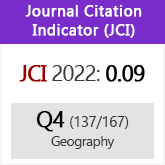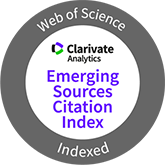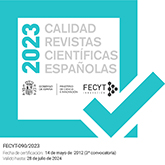Entrepreneurs and failed projects from LEADER and PRODER in Andalusia in the period 2000-2006. Profile and reasons for withdrawal
DOI:
https://doi.org/10.3989/estgeogr.201806Keywords:
LEADER approach, neoendogenous rural development, failed/fallen projects, rural women and youth, AndalusiaAbstract
For 25 years, the LEADER approach has contributed to incorporate new principles to recent theories of neoendogenous rural development. For this Initiative, an analysis of the projects has been made that, having initially been approved, were not finished, in order to know the profile of the promoters, types of investment, and main causes of their failure. The files not executed during the period 2002-2008, from the Local Action Groups of the province of Granada, have been consulted, and exhaustive interviews, both with the technicians and the managers of such groups, they have been carried out. The projects analized show a prevalence of the private entrepreneur over the public, and the young and new entrepreneurs compared to those from other groups. Among the main final causes of failure are: inadequate planning and funding, not being able to provide the demanded documentation in time, and the rigidity, in terms of time and bureaucratic requirements, of such programmes.
Downloads
References
Ariga, O., Lafuente, E. y Vaillant, Y. (2009): "Reasons for the relatively lower entrepreneurial activity levels of rural women in Spain", Sociologia Ruralis, 49(1), pp. 70-96. https://doi.org/10.1111/j.1467-9523.2008.00475.x
Arnalte, E., Baptista, F.O. y Garrabou, R. (2012): "Viejas y nuevas dimensiones de la cuestión de la tierra", Revista Española de Estudios Agrosociales y Pesqueros, 231, pp. 11-28.
Barke, M. y Newton, M. (1997): "The EU LEADER initiative and endogenous rural development: the application of the programme in two rural areas of Andalusia, Southern Spain", Journal of Rural Studies, 13, pp. 319-341. https://doi.org/10.1016/S0743-0167(97)00027-2
Camarero, L. y Sampedro, R. (2008): "¿Por qué se van las mujeres? El continuum de movilidad como hipótesis explicativa de la masculinización rural", Revista Española de Investigaciones Sociológicas, 124, pp. 73-105. https://doi.org/10.2307/40184907
Cejudo, E. Navarro, F. y Maroto, J.C. (2016): "Perceptores del Subsidio de Desempleo Agrario y de la Renta Agraria en el sur de España: evolución, diferencias territoriales y estructura por edad y sexo", Ager, 20, pp. 33-72.
Cejudo, E. Navarro, F. y Cañete, J.A. (2016). "Distribución territorial de los trabajadores eventuales agrarios subsidiados en Andalucía: implicaciones geopoblacionales", Boletín de la Asociación de Geógrafos Españoles, 72, pp. 89-108.
Cheshire, L., Esparcia, J. y Shucksmith, M. (2015): "Community resilience, social capital and territorial governance", Ager, 18, pp. 7-38.
Cruces, C. y Palenzuela, P. (2006): "Emprendedoras rurales en Andalucía: posibilidades y límites de sus estrategias", Revista de Estudios Agrosociales y Pesqueros, 211, 239-305.
Dargan, L. y Shucksmith, M. (2008): "LEADER and innovation", Sociologia Ruralis, 48(3), pp. 274-291. https://doi.org/10.1111/j.1467-9523.2008.00463.x
Esparcia, J., Noguera, J., y Pitarch, M. (2000): "LEADER en España: desarrollo rural, poder, legitimación, aprendizaje y nuevas estructuras", Documentos de Análisis Geográfico, 37, pp. 95-113.
European Economic Community (1988): "The future of rural society", Bulletin of the European Communities. COM (88) 501, pp. 1-68.
Farrell, G. y Thirion, S. (2005): "Social capital and rural development: from win-lose to win-win with the LEADER Initiative", en D. Schmied (ed.), Winning and losing. The changing geography of Europe's rural áreas, London, Ashgate, pp. 45-61.
Furmankiewicz, M., Thompson, N., y Zielinska, M. (2010): "Area-based partnerships in rural Poland: the post-accession experience", Journal of Rural Studies, 26, pp. 52-62. https://doi.org/10.1016/j.jrurstud.2009.05.001
Garrabou, R., Planas, J., Saguer, E. y Vicedo, E. (2014): "Propiedad de la tierra y desigualdad social en el mundo rural catalán de mediados de siglo XIX", Historia Agraria, 63, pp. 115-150.
González de Molina, M. (2014):"Introducción", en M. González de Molina (coord.) La cuestión agraria en la historia de Andalucía, Sevilla, Centro de Estudios Andaluces, pp. 9-20.
González de Molina, M., Infante, J. y Herrera, A. (2014): "Cuestionando los relatos tradicionales: desigualdad, cambio liberal y crecimiento agrario en el Sur peninsular (1752-1901)", Historia Agraria, 63, pp. 55-88.
Goodwin, M. (1998): "The governance of rural areas: some emerging rural research issues and agendas", Journal of Rural Studies, 14, pp. 5-12. https://doi.org/10.1016/S0743-0167(97)00043-0
Guinjoan, E., Badía, A. y Tulla, A.F. (2016): "El Nuevo paradigma del desarrollo rural. Reflexión teórica y reconceptualización a partir de Rural Web", Boletín de la Asociación de Geógrafos Españoles, 71, pp. 179-204.
High, C. y Nemes, G. (2007). "Social learning in LEADER: exogenous, endogenous and hybrid evaluation in rural development", Sociologia Ruralis, 47(2), pp. 103-119. https://doi.org/10.1111/j.1467-9523.2007.00430.x
Junta de Andalucía (2008): Programa de Desarrollo Rural de Andalucía 2007-2013. Sevilla. Comité de Desarrollo Rural, Junta de Andalucía, 475 pp.
Marsden, T. (2009): "Mobilities, vulnerabilities and sustainabilities", Sociologia Ruralis, 49(2), pp. 113-131. https://doi.org/10.1111/j.1467-9523.2009.00479.x
Marsden, T. y Murdoch, J.M. (1998): "The shifting nature of rural of rural governance and community participation", Journal of Rural Studies, 14, pp. 1-4. https://doi.org/10.1016/S0743-0167(97)00042-9
Martínez, F., Sacristán, H. y Yagüe, J.L. (2015): "Are local action groups, under LEADER approach, a good way to support resilience in rural areas?", Ager, 18, pp. 39-63.
Midmore, P. (1998): "Rural policy reform and local development programmes: appropriate evaluation procedures", Journal of Agricultural Economics, 49(3), pp. 409-426. https://doi.org/10.1111/j.1477-9552.1998.tb01281.x
Navarro, F., Woods, M. y Cejudo, E. (2016): "The LEADER Initiative has been a victim of its own success. The decline of the bottom-up approach in Rural Development Programmes. The cases of Wales and Andalusia", Sociologia Ruralis, 56(2), pp. 270-288. https://doi.org/10.1111/soru.12079
Ramos, E. y Delgado, M. (2003): "European rural development. Programmes as a mean of strengthening democracy in rural areas. Walking towards justice: democratization in rural life", Research in Rural Sociology and Development, 9, pp. 135-157. https://doi.org/10.1016/S1057-1922(03)09009-7
Ramos E. y Romero J. (1995): "Del "productivismo" al "ruralismo": una reflexión sobre la política agraria en Andalucía", Revista de Estudios Agrosociales 169, pp. 175-212.
Ray, C. (1998): "New places and space for rural development in the European Union: an analysis of the UK LEADER II Programme", Working Paper, 34, pp. 1-51.
Ray, C. (2000): "The EU LEADER Programme: Rural Development Laboratory", Sociologia Ruralis, 40(2), pp. 163-171. https://doi.org/10.1111/1467-9523.00138
Ray, C. (2006): "Neoendogenous rural development in the EU", en P. Cloke, T. Marsden, y P. H. Mooney (eds.), Handbook of rural studies, London, Sage, pp. 295-336. https://doi.org/10.4135/9781848608016.n19
Sánchez, P., Gallardo, R. y Ce-a, F. (2014): "Rural areas face the economic crisis: analysing the determinants of successful territorial dynamics", Journal of Rural Studies, 35, pp. 11-25. https://doi.org/10.1016/j.jrurstud.2014.03.007
Shortall, S. (2008): "Are rural development programmes socially inclusive? Social inclusion, civic engagement, participation, and social capital: exploring the differences", Journal of Rural Studies, 24 (4), pp. 450-457. https://doi.org/10.1016/j.jrurstud.2008.01.001
Shucksmith, M. (2000): "Endogenous development, social capital and social inclusion: perspectives from LEADER in the UK", Sociologia Ruralis, 40(2), pp. 208-218. https://doi.org/10.1111/1467-9523.00143
Vaillant, Y. y Lafuente, E. (2007): "Do different institutional frameworks contition the influence of local fear of failure and entrepreneurial examples over entrepreneurial activity?", Entrepreneurship and Regional Development, 19(4), pp. 313-337. https://doi.org/10.1080/08985620701440007
Viladomiu, L., Rosell, J. y Francés, C. (2010): "Factores determinantes de la participación de la mujer como promotoras de proyectos LEADER +", Revista Española de Estudios Agrosociales y Pesqueros, 226, pp. 177-206.
Downloads
Published
How to Cite
Issue
Section
License
Copyright (c) 2018 Consejo Superior de Investigaciones Científicas (CSIC)

This work is licensed under a Creative Commons Attribution 4.0 International License.
© CSIC. Manuscripts published in both the printed and online versions of this Journal are the property of Consejo Superior de Investigaciones Científicas, and quoting this source is a requirement for any partial or full reproduction.All contents of this electronic edition, except where otherwise noted, are distributed under a “Creative Commons Attribution 4.0 International” (CC BY 4.0) License. You may read here the basic information and the legal text of the license. The indication of the CC BY 4.0 License must be expressly stated in this way when necessary.
Self-archiving in repositories, personal webpages or similar, of any version other than the published by the Editor, is not allowed.
















